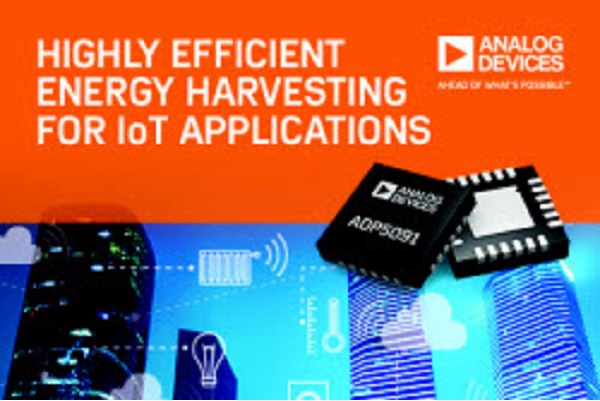Analog Devices, Inc. today announced a power management unit (PMU) designed to enable faster and more efficient energy harvesting in IoT applications where energy is scarce. Due to its unique circuit design, the ADP509x is among the most efficient energy harvesting PMUs on the market, converting harvested power down to the 16 μW to 100mW range with only sub-μW operation losses. The ADP509x also delivers the fastest cold-startup time available today. Devices relying on energy harvesting in low energy conditions often have to slowly accumulate enough energy to turn on, resulting in long delays before the device can start sensing, processing, and transmitting. This can result in missed data collection, slow operation, and poor user experience. The ADP509x PMU solves these problems with an innovative multiple-power-path design, which enables faster startups and smoother operation.
Energy harvesting is a key critical component in achieving fully autonomous IoT solutions. Not only does it drive significant cost savings in applications where battery replacement is costly, but it creates possibility for a host of new applications where battery replacement is impossible or impractical. A key barrier for energy harvesting is that in many applications energy from the environment is only available at very low levels (for example, low-light indoor solar harvesting), and periodically not at all. This requires power management solutions that can not only enable satisfactory system operation with very little energy, but also efficiently manage energy storage devices to satisfy energy demand at times when no energy is being harvested.
“We believe the ADP509x is a big step toward enabling new autonomous applications for IoT,”said Michael Murray, general manager of Industrial IoT, Analog Devices. “We’ve been collaborating with other companies like Alta Devices, which makes extremely innovative and efficient solar cells, to explore what new possibilities exist by pairing the most efficient energy harvesting components together. Not only will this have huge benefits for traditional IoT applications, but it will also lower some significant hurdles in emerging applications such as e-textiles and other wearables.”















